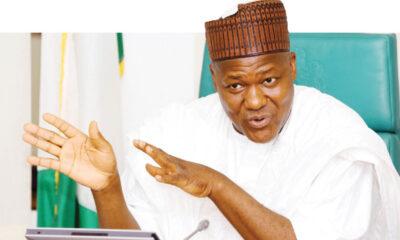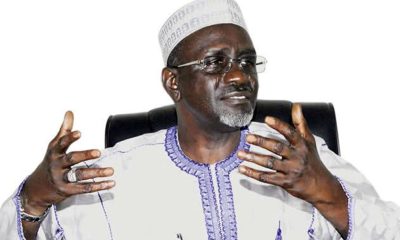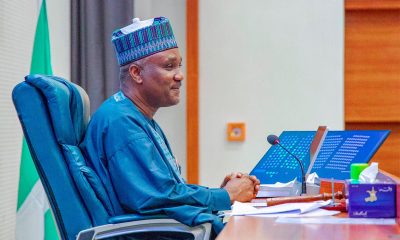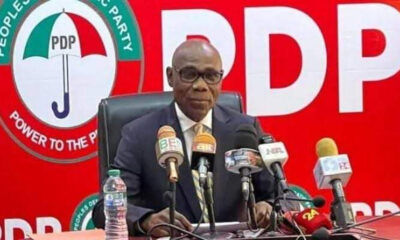Opinion
Tinubu: Overfed father of starving children, By Farooq Kperogi

Tinubu: Overfed father of starving children, By Farooq Kperogi
The unfailingly abiding emotional investment I have in the wellbeing of common people springs forth from my experiential and mediated identification with the twinge of hunger and misery that poverty breeds.
As people who read my columns know, my father, who died on December 31, 2016, was an Arabic/Islamic Studies teacher at a government-owned primary school for almost four decades. His salary was modest and often not guaranteed both during military regimes and civilian administrations. So, my siblings and I grew up in relative deprivation.
But there were choices he made as a father that earned him our unalloyed filial respect, loyalty, and love in spite of our lack. He never ever ate outside for any reason. Even when he was invited to preside over naming or wedding ceremonies, as Malams of his stature often were, he didn’t eat the food he was offered at the venues of the ceremonies. He would always bring it home to us.
When his colleagues would ask him why he didn’t eat outside, he would tell them that he couldn’t bear to luxuriate in outside culinary treats when the children for whom he lived stayed hungry at home or ate inferior food. He thought it was unjustifiably selfish.
He also never had more meat on his plate than we had when we had lunch or dinner. Each time our stepmother gave him more pieces of meat than she gave us children, like clockwork, he would consistently share the extra pieces with us and would watch us like a protective mother hen as we ate.
If he didn’t have enough money to buy new clothes for us, he never bought for himself. In fact, he would often buy clothes for us at the expense of donning threadbare clothes. His fellow Malams were often better dressed than he—because of us.
And he always ensured that, no matter the circumstance, our school fees were paid—even if we couldn’t afford to buy all required textbooks.
We didn’t need to be told that he loved us with the entire fiber of his being. We could feel, even touch, his pure, total affection.
So, on days we had no food, or had food but without meat, and on festive occasions when we didn’t have new clothes like our agemates did, we were never resentful. We knew we would have anything if he could afford it.
And even when he disciplined us severely—and he was a strict, stick-wielding, no-nonsense disciplinarian—for our youthful transgressions and indiscretions, we forgave him easily. As young as we were, he made us understand the concept of tough love without articulating it.
READ ALSO:
- 22,500 Nigerians obtained fake degrees from Benin Republic, Togo – Minister
- Senate considers another controversial bill after withdrawal of ‘Counter Subversion’
- Rivers: PDP governors rally full support for Fubara against Wike
That’s why I miss my father sorely every single day, and why he continues to be my most important role model.
There is a parallel between being the father—or mother—of children and being the president of a country. Just as selfless, responsible parenting automatically inspires filial respect and love, compassionate, responsible governance engenders patriotism and makes possible national self-sacrifice from citizens.
The more I read stories of President Bola Ahmed Tinubu’s profligate expenditures and vain acquisitions amid the once-in-a-generation cost-of-living crisis that ordinary Nigerians are going through as a direct consequence of his economic policies, the more I think of my late father.
If my father had splurged on himself while his children starved, would we have been as emotionally attached to him as we were—and still are posthumously? Would he have been able to persuade us that we didn’t have the fine things of life because he lacked the means to buy them for us?
Nigeria has one of the world’s highest poverty rates. Most Nigerians now live in way worse poverty than I lived in when I was growing up. Yet Tinubu’s economic reforms consist basically in denuding citizens of some of the subsidies we had taken for granted—relatively cheap petrol (which leads to affordable transportation and food costs), subsidized education (which allows the son of a primary school teacher like me to go to university), etc.
The justification for these “reforms” is that Nigeria is too poor to be able to sustain programs that help the poor to survive and thrive. So, sacrifice is required to rejig the economy. Money saved from the (temporary) withdrawal of the state from the lives of the people will be invested to ensure a greater, brighter, more prosperous tomorrow. Untrue, but fair enough.
But why is the sacrifice a one-way traffic? At the time that everyday folks have been told to contend with unsustainably extortionate petrol and electricity prices, which have had a domino effect on all aspects of life, President Tinubu bought for himself a new presidential jet worth $150 million, which is the equivalent of more than N150 billion!
READ ALSO:
- 20 medical students kidnapped in Benue regain freedom
- Bandits tie victim to tree, demand 130 motorbikes for 26 women
- Bizman accuses police officer’s children of killing his 27-year-old son
This is aside from the fact that the sum of N12.7 billion has been allocated in the 2023 supplementary budget for the maintenance of the presidential air fleet. A country too poor to provide much-needed subsidies for its poor shouldn’t have a president who flies in an expensive plane or an air fleet that guzzles that much money to maintain.
The UK is a much wealthier country than Nigeria. It gives its citizens the sorts of subsidies that Nigerians have been blackmailed into accepting that they are unworthy of, but the UK Prime Minister had no dedicated aircraft until 2016 when a plane was purchased for the Prime Minister (and “other ministers and senior members of the royal family when they travel on official engagements”) at the cost of $15 million.
UK government officials, including the Prime Minister, used to charter commercial jets for official travels. Until 2016, the “United Kingdom was, in fact, the only one among the Group of Seven industrialized countries without a dedicated government VIP jet,” according to the Points Guy website.
Recall that Tinubu caused a well-deserved national stir when he ordered the purchase of a presidential yacht worth N5 billion sometime in 2023. It also came to light that he bought for himself a bulletproof Escalade SUV worth N1.5 billion, among other examples of indefensible epicurean lavishness.
In response to my last week’s column, a government apologist (who knows if he is a government appointee?) pointed out to me that, “The price of petroleum [in Nigeria] was the second lowest in the world (in dollar terms) by the time the subsidy was (partially) removed.”
He said this as an indictment. He is miffed that Nigeria had the second lowest petrol price in the world. I doubt this is even true, but even if it were true, what’s wrong with that? It’s like a wealthy but stingy father who splurges on himself telling his starving children that they don’t deserve the crumbs he throws their way because there are poorer neighbors with way hungrier children than they.
So, the rich but penny-pinching father stops the crumbs to the children but continues to luxuriate in conspicuous opulence while telling his children to learn to sacrifice for a greater tomorrow. That’s not a father worth respecting or obeying.
A president who indulges in the kind of primitive acquisitiveness and conspicuous consumption that are becoming the trademark of President Tinubu at the expense of subjecting the broad masses of the people to the most extreme deprivation that Nigeria has witnessed in living memory has no moral right to expect patriotism or willing sacrifice.
If President Tinubu and members of this government are serious about “sacrificing,” in light of the fact that Nigeria is “broke,” they should first give up their own “subsidies.” There is neither honor nor dignity in being the overfed father of starving children.
Tinubu: Overfed father of starving children, By Farooq Kperogi
Farooq Kperogi is a renowned newspaper columnist and United States-based Professor of journalism.
Opinion
Ademola Lookman showed Davido and Kemi Badenoch that wisdom is not by age – Omokri
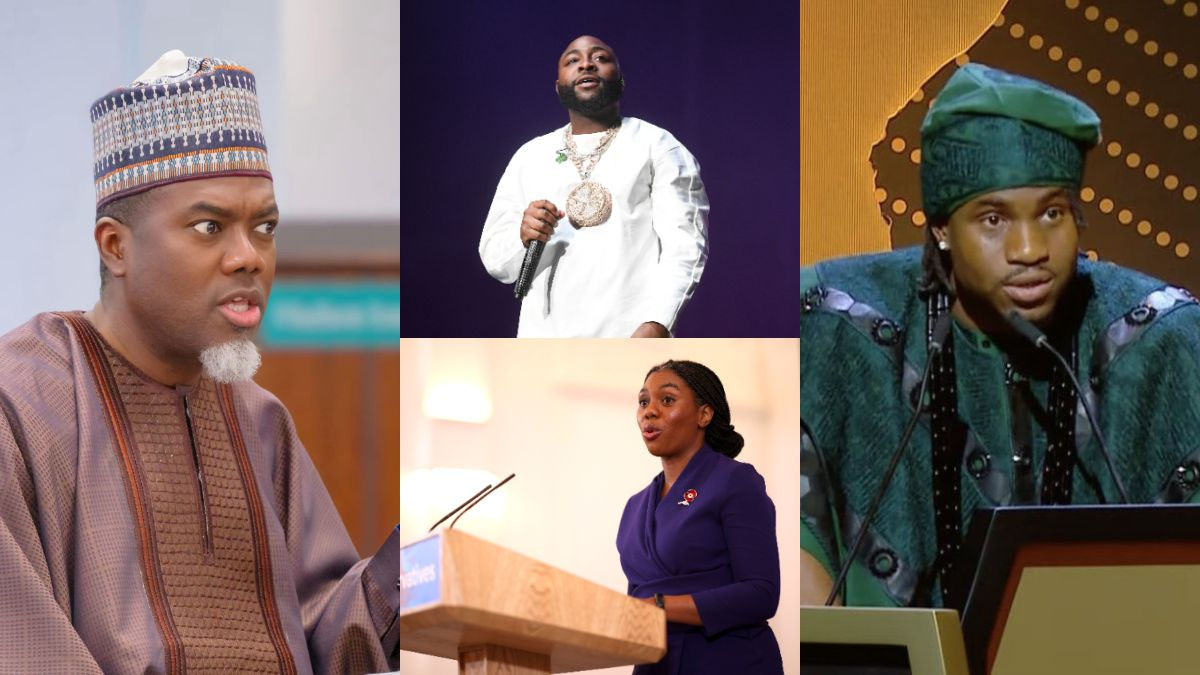
Ademola Lookman showed Davido and Kemi Badenoch that wisdom is not by age – Omokri
Recently, the singer David Adeleke was given a global stage to do whatever he wanted and deliver any message.
Sadly, Mr. Adeleke used the opportunity to speak in an American accent. Not only that, he used that American accent to talk down on Nigeria and tell the world not to invest in Nigeria because, as he put it, Nigeria’s “economy is in shambles”.
Coincidentally, a month after his faux pas, Kemi Badenoch, probably inspired by Davido, used her British accent to talk down Nigeria, calling us “a very poor country” where the police rob citizens.
But the interesting thing about her own case is that the next day, the BBC featured a panel of Conservative Party big shots, and one of them, Albie Amankona, a party chieftain from Chiswick, who is also a celebrity broadcaster, said, and this is a direct quote:
“If you are a Brexiteer, and you are saying we need to be expanding our global trade beyond the European Union, we want to be looking at emerging markets for growth, don’t slag off one of the fastest growing economies in Africa.”
Is it not strange that it took the BBC and a British politician to promote Nigeria as one of the fastest-growing economies in Africa?
And just when we thought it was all bad news, God gave us a breath of fresh air in the youthful Ademola Lookman, who used the global podium granted to him by his winning the 2024 African Footballer of the Year award to promote and project Nigeria and the Lukumi Yoruba language to the world.
READ ALSO:
- MURIC tackles Kemi Badenoch: Can you bring UK police when coming to Nigeria?
- Reps probe $754.2m, N141.6bn tractors, harvesters contract fraud
- Gov Adeleke intervenes in man sentenced to death for stealing fowl (Video)
Wisdom is not by age. If not, Ademola Lookman, who is just twenty-seven, will not have displayed greater wisdom than David Adeleke, who is thirty-two, and Kemi Badenoch, at forty-four.
Mr. Lookman proved that the age of Methuselah has nothing to do with the wisdom of Solomon.
And it is not as though other ethnicities with global icons do not also project Nigeria. They do.
Dr. Mrs. Ngozi Okonjo-Iweala spoke Igbo on the podium of the WTO in Geneva. In terms of prestige, she is FAR above Lookman.
My campaign is not for the Lukumi Yoruba alone. It is for all sub-Saharan Black Africans to learn to speak their language and not use ability to speak English or another colonial language as a measure of intelligence.
Besides Lukumi Yoruba and Hausa, every other Nigerian language, including Fulfulde, is gradually dying out.
General Buhari is half Fulani and half Kanuri. Yet, he cannot speak either Fuifulde or Kanuri. But he speaks Hausa and English.
Fact-check me: In 2012, UNESCO declared Igbo an endangered language.
However, the Lukumi Yoruba are to be commended for their affirmative actions to advance their language and culture.
Let me give you an example. All six Governors of the Southwest bear full Lukumi names: Jide Sanwa-Olu, Seyi Makinde, Dapo Abiodun, Ademola Adeleke, Abiodun Oyebanji, and Orighomisan Aiyedatiwa.
No other zone in Nigeria has all its governors bearing ethnic Nigerian names as first and second names. They either bear Arabic or European names as first names or even first and second names.
If we truly want to be the Giant of Africa, we must take affirmative steps to preserve our language and culture so we can have children like Ademola Lookman.
Teach your language to your children before you teach them English. They will learn English at school. Being multilingual is scientifically proven to boost intelligence.
Fact-check me: In the U.S., Latino kids do not speak English until they start school. They learn Spanish as a first language.
Even if you relocate to the UK, the best you can be is British. You can never be English. And if your choice of Japa is the U.S., the highest you can be is an American citizen. You will never become a White Anglo-Saxon Protestant WASP.
Your power lies in balancing ancient and modern, Western and African, English (or other colonial languages) and your native tongue.
That is the way to reverse language erosion, like the Lukumi Yoruba.
Ademola Lookman showed Davido and Kemi Badenoch that wisdom is not by age – Omokri
Opinion
Kemi Badenoch’s Hate for Nigeria – Femi Fani-Kayode

Kemi Badenoch’s Hate for Nigeria – Femi Fani-Kayode
“I find it interesting that everyone defines me as a Nigerian. I identify less with the country than with my specific ethnic group. I have nothing in common with the people from the north of the country, the Boko Haram, where Islamism is. Being Yoruba is my true identity and I refuse to be lumped with the northern people of Nigeria who were our ethnic enemies, all in the name of being called a Nigerian”- @KemiBadenoch.
Dangerous rhetoric
Kemi Badenoch, MP, the leader of the British Conservative Party and Opposition in the @UKParliament, has refused to stop at just denigrating our country but has gone a step further by seeking to divide us on ethnic lines.
She claims that she never regarded herself as being a Nigerian but rather a Yoruba and that she never identified with the people from the Northern part of our country who she collectively describes as being “Boko Haram Islamists” and “terrorists”.
This is dangerous rhetoric coming from an impudent and ignorant foreign leader who knows nothing about our country, who does not know her place and who insists on stirring up a storm that she cannot contain and that may eventually consume her.
It is rather like saying that she identifies more with the English than she does with the Scots and the Welsh whom she regards as nothing more than homicidal and murderous barbarians that once waged war against her ethnic English compatriots!
All this coming from a young lady of colour that is a political leader in a multi-ethnic, multi-religious and multi-cultural country that lays claim to being the epitome of decency and civilisation! What a strange and inexplicable contradiction this is.
READ ALSO:
- CCT chair removal: Civil groups sue Tinubu, Akpabio, others
- New President-General of Ohanaeze Chukwu to reign for 27 days
- Economy: I derive no pleasure in causing Nigerians pain, says Tinubu
Her intentions are malevolent and insidious and her objective, outside of ridiculing and mocking us, is to divide us and bring us to our knees.
I am constrained to ask, what on earth happened to this creature in her youth and why does she hate Nigeria with such passion?
Did something happen to her when she lived here which she has kept secret?
Kemi Badenoch’s Hate for Nigeria – Femi Fani-Kayode
Opinion
The cockroach called Dele Farotimi (1)

The cockroach called Dele Farotimi (1)
Tunde Odesola
(Published in The PUNCH, on Friday, December 13, 2024)
The official name for cage fight is Mixed Martial Arts. Street fight, known as ‘ìjà ìgboro’ in Yoruba, is the bane of Ibadan people, says the panegyric of Oluyole, the city of brown roofs scattered among seven hills. MMA, I think, is organised street fighting.
But, long before MMA became a global combat sport in 2000, little devils of St Paul Anglican (Primary) School, Idi-Oro, Lagos, and Archbishop Aggey Memorial Secondary School, Mushin, Lagos, engaged in ‘ìjà ìgboro’, the progenitor of Mixed Martial Arts. Retrospectively, I’m guilty of being part of the little devils of both schools.
Because, instead of heeding the ‘blessed are the peacemakers’ injunction in the Holy Scriptures, to ‘inherit the kingdom of God’, what we did as little demons that we were was to add fuel to the embers of hostility smouldering among fellow students.
As soon as you noticed two students in a heated argument, instead of you to sue for peace, the naughty reaction was for you to grab some soil in clenched fists and spread your fists towards the two disputants, daring both pupils to slap one of the outstretched fists: ‘Ení bá lè jà, kó gbon!’
‘Ení bá lè jà, kó gbon!’ was a call to arms. To prove you’re a lionheart ready to fight, you slap the clenched fist open and watch its content pour out to the ground.
So, in a jiffy, you would see friends who were laughing a while ago, engage in a free-for-all instanter. Regrettably, I initiated some of such fights and participated in not a few. You probably can’t grow up in Mushin and be fainthearted.
Taliatu Mudashiru was my friend and classmate in Forms 1 and 2. Occasionally, when I didn’t get dropped off at school by my father, and I had to make it to school on my own, I first trek from our Awoyokun Street residence to Taliatu’s house on Adegboyega Street before both of us would head up to Akinade Ayodeji’s house two blocks away en route to school.
I thought I was stronger than Tali, as we fondly called him, or Pali Tutu (Wet Cardboard) – if the caller was a mischievous classmate – until one day when we disagreed during a break-time chatter involving other classmates.
A peacemaker stepped forward with clenched fists, chanting, ‘K’éyin lè jà, k’émi lé wò’ran, Èsù ta’po si,’ evoking Baba Devil himself. I slapped one of the fists; Tali slapped the other! ‘Ha, Tali ke? I go kill sombodi!’
Toe-to-toe, Tunde rained blows. Tit-for-tat, Tali responded. We upturned desks and seats as the brawl spiralled to the delight of cheering classmates. But it was short-lived as the break-time bell saved the day. We swore at each other but classmates begged us, like peacemakers, to save our punches and wait till after-school hours to throw them.
READ ALSO:
- Gunmen attack Gombe community, kill cleric, set houses ablaze
- CAF awards 2024: Lookman, Nnadozie make final list
- Tinubu’s economic policies causing hunger, poverty – Nigerian gov
After school, excited classmates such as Taliatu Olokodana, Akinade Ayodeji alias Kuruki, Hakeem Adigun alias Slate, Jide Oladimeji alias Agama; Kunle Adeyoju alias Iron Bender, Sunday Pedro Oshokai, Sanmi Okuwobi, Sule Mustapha alias Maito; Olalekan Egungbohun, Kazeem Osuolale alias Oju etc led Tali and me to ‘Ojú Olómo ò to’, an arena so named because no parent or guardian’s eyes ever got to see what happened there.
Only Lukmon Yusuff aka OC, Jide Ajose and Segun Majekodunmi would have separated us if they were around. For his good-naturedness, Jide got the nickname Unreasonable while Segun was called Brother because he belonged to the Deeper Life Church and Yusuff got nicknamed O.C. because of his effectiveness as a football defender.
The ‘Ojú Olómo ò to’ was the playground of a primary school that had closed for the day. Impish classmates sat around the edge of the big field, leaving Tali and I at the centre to unleash the devilry in us.
Tali, bigger and an inch taller, was hoping to use his weight to an advantage, grabbing at me but I knew if he slammed me he would feed me with sand, so I used my fists to keep him off.
We wrestled and boxed and kicked and clawed for God knows how long. There was no referee. There was no timeout. There were only ringside viewers who laughed and cheered every kick and blow and the sight of blood. Tali and I bled all over, spent and gasped for breath.
Then I threw a punch, it caught Tali right in the face, and he first went down in a squat, before flattening out on his back. I should have jumped on him and finished him off, but I was barely breathing. I just left him and I turned away to look for my bag and shoes.
The following day, Tali was looking for me on the assembly ground. He appeared proud of us. He shook hands with me vigorously and we hugged for a long period – like warriors after a pyrrhic victory. He earned my respect, I earned his. Tali probably thought I was a sportsman for not finishing him off when he blanked out, but little did he know that all that was on my mind when he fell was me getting home. I probably would’ve fallen too if the fight had lasted longer.
There are similarities between my fight with Tali and the ongoing fight between one of Nigeria’s heavyweight lawyers, Aare Afe Babalola and human rights activist and lawyer, Mr Dele Farotimi.
I know Nigeria is broken and needs fixing urgently. I know that to fix it, something has to give. I know Nigeria’s coconuts of corruption must be cracked on skulls and the water thereof used as atonement for the nation’s corruption.
READ ALSO:
I see many coconuts. I also see the head of Babalola and that of Farotimi. I see other heads, too. But whose skull(s) would crack open the coconuts?
I see a poisonous cockroach encircled by a brood of chickens. Among the chickens is the breed called Supreme. There’s also a breed called Appeal and another breed called High. There’s yet another breed called SANyeri, a name symbolising the breed’s big gowns. The chickens thrust their heads forward, sharply looking right and left, watching intently, communicating in esoteric language. What shall we do to this irritant?
Yet, the cockroach is adamant in the valley of jeopardy, six legs gangling, two antennas roving; person wey wan don die jam person wey wan kill am.
Tali Vs. Tunde. Today, I can’t even remember what caused the disagreement that snowballed into our fight, but I can never forget the pain of the fight. I had thought I would make light work of Tali but I didn’t see his gallantry coming.
Although I’ve never met Baba Babalola, he comes across as a man of commendable philanthropy and frankness. It’s only frankness that could make him stand by the Labour Party and its presidential candidate, Mr Peter Obi, in the 2023 presidential election when the elite of his tribe was queuing behind Asiwaju Bola Tinubu as ‘Shon of the Shoil’.
In the 2023 presidential election, I was neither BATified nor Atikulated just as I wasn’t Obidient. In some articles during the countdown to the election, I called for an overhaul of the 1999 Constitution before the conduct of the general elections, saying none of the presidential candidates would succeed as president if the Constitution wasn’t amended.
I also said there was no ideological difference among the All Progressives Congress, Peoples Democratic Party and Labour Party. If they were different, Nigeria wouldn’t witness six House of Representatives members of the Labour Party defecting to the APC recently, despite LP’s promise of a new Nigeria. While I predict more defections in the coming days, those already defected include Tochukwu Okere (Imo), Daulyop Fom (Plateau), Donatus Matthew (Kaduna), Bassey Akiba (Cross River), Iyawe Esosa (Edo) and Fom Daniel Chollon (Plateau).
In my recommendations, I called for devolution of powers to the states, resource control, independent candidacy and patriotism by the generality of Nigerians for a new order.
And I’ve not repented from my belief that elected Nigerian politicians loot the treasury according to the amount of money available in it, not because one was more decent than the other or one party was better than the other.
This is why I find the anti-corruption campaign of 56-year-old lawyer and human rights activist, Dele Farotimi, assuring though I’m not going to touch the libel stuff just yet.
Although Farotimi is an LP member, his rhetoric resonates with equity, fairness and justice – cornerstones of democracy.
However, there are concave and convex perspectives on the Babalola-Farotimi issue. In secondary school, Physics was intriguing to me, though I found its abstraction intimidating and perplexing. It was in Physics that I learnt about convex and concave lenses. I was taught in secondary school that both lenses are used for correcting short-sightedness and long-sightedness.
Tali died a long time ago. May his soul rest in peace. Baba Afe Babalola is 11 years older than my father who died last March at 84. May the Lord grant Baba Babalola more years in good health, and may he see the end of this war.
To be continued.
Email: [email protected]
Facebook: @Tunde Odesola
X: @Tunde_Odesola
LinkedIn: @Tunde Odesola
The cockroach called Dele Farotimi (1)
-

 metro3 days ago
metro3 days agoMany die at Ibadan children’s Christmas party stampede, organisers arrested (Video)
-

 metro3 days ago
metro3 days agoCourt orders Minister, NIS to pay N3m compensation, issue passport to complainant
-

 metro2 days ago
metro2 days agoFG transfers electricity market regulatory oversight in Lagos to LASERC
-

 metro20 hours ago
metro20 hours agoCourt stops customs from seizing imported rice in open market
-

 metro23 hours ago
metro23 hours agoAfe Babalola: Court grants Dele Farotimi bail, barred from media interviews
-

 News1 day ago
News1 day agoAdebayo Ogunlesi, 2 other Nigerians make Forbes 50 wealthiest Black Americans list 2024
-
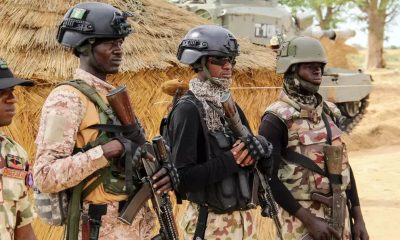
 metro2 days ago
metro2 days agoAbuja demolition: Soldiers attack FCTA officials, seize vehicles
-

 metro2 days ago
metro2 days agoOoni’s ex-wife, Naomi, arrested over children’s carnival stampede in Ibadan



